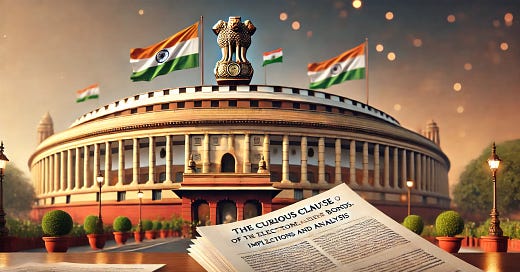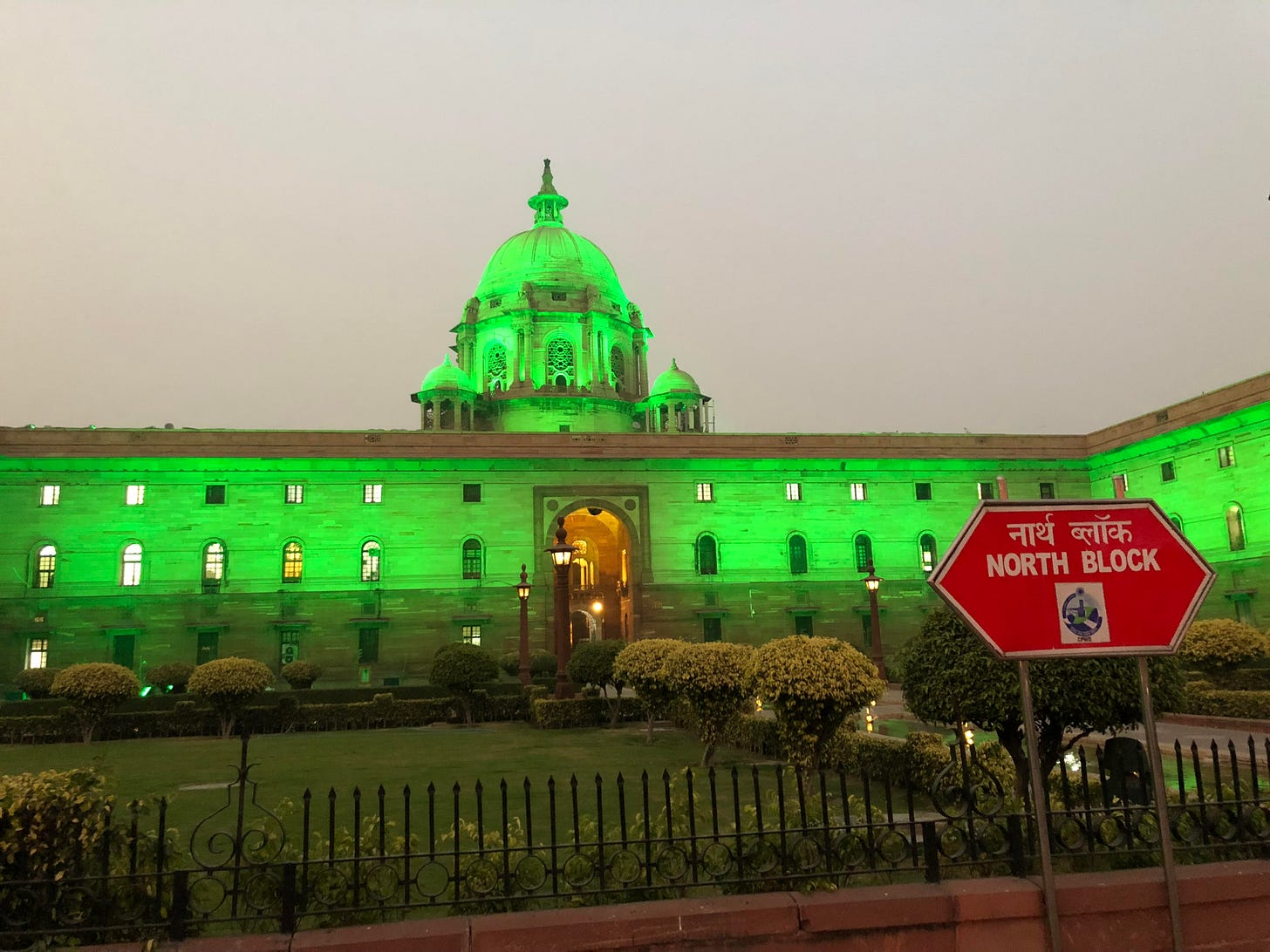The Curious Clause of Electoral Bonds in the Income Tax Bill, 2025: Implications and Analysis
Should the reference to electoral bonds in the Bill be regarded as a mere legislative oversight, or is it a necessary provision to ensure continuity and consistency in tax assessment proceedings?
Does the New Income Tax Bill Seek to Resurrect Electoral Bonds?
In a surprising development, the newly proposed Income Tax Bill, 2025 retains provisions related to electoral bonds, despite the Supreme Court having declared this funding mechanism unconstitutional in February 2024. This apparent contradiction has sparked debate among tax and constitutional experts, raising questions about whether this inclusion is a legislative oversight or an indication of the government’s intent to revive the scheme in a modified form. The electoral bonds continue to appear in Schedule VIII of the bill, which pertains to "Income not to be included in the total income of political parties and electoral trusts."
The Constitutional Context and Recent Developments
The Supreme Court’s judgment on February 15, 2024, categorically struck down the electoral bonds scheme, which had been operational since 2018. The five-judge Constitution Bench unanimously ruled that the scheme violated citizens’ right to information under Article 19(1)(a) of the Constitution. The Court deemed the anonymous political funding mechanism "unconstitutional," asserting that it infringed upon the fundamental rights of freedom of speech and expression.
Introduced in 2017 through the Finance Act and implemented in 2018, the electoral bonds scheme allowed anonymous donations to political parties through bearer instruments. Various entities, including individuals and corporations, could purchase bonds from authorized banks, which political parties could encash without disclosing the donor’s identity. The bonds ensured complete anonymity and confidentiality in political funding.
Despite the clear judicial pronouncement, the new Income Tax Bill, 2025, which aims to replace the 64-year-old Income Tax Act of 1961, continues to reference electoral bonds in Schedule VIII. This 622-page bill is intended as a simplified version of the existing tax law, which has grown increasingly complex due to over 4,000 amendments over the decades.
Specific Provisions in the New Tax Bill
The retained provisions specifically appear in Schedule VIII, which outlines conditions for political parties to claim tax exemptions on voluntary contributions. One notable condition states:
"No donation exceeding Rs 2,000 is received by such political party otherwise than by an account payee cheque drawn on a bank or an account payee bank draft or use of electronic clearing system through a bank account or through such other electronic mode as prescribed or through electoral bond."
Furthermore, Schedule VIII explicitly defines an electoral bond as:
"A bond referred to in the explanation to sub-section (3) of section 31 of the Reserve Bank of India Act, 1934."
This definition mirrors the original framework of the electoral bonds scheme before it was struck down by the Supreme Court.
The inclusion of these provisions creates a paradoxical if not a peculiar legal situation, where a tax law continues to reference and potentially provide exemptions for an instrument that has been declared unconstitutional by the highest court in the country.
Expert Interpretations and Implications
Legal and tax experts have offered diverging interpretations regarding this unexpected inclusion. According to AMRG & Associates Senior Partner Rajat Mohan, the reference to electoral bonds in the new Income Tax Bill could stem from two possibilities:
A simple legislative oversight where outdated provisions were carried forward without careful review.
A deliberate strategy to keep the door open for a modified version of the scheme in the future.
Mohan elaborates that while the Supreme Court had strong and justified grounds for striking down the scheme, the concerns it highlighted could still be addressed through structured dialogue and expert consultations. He suggests that the government retains the legislative authority to reintroduce a revised political donation framework, provided that such a framework ensures transparency and adheres to constitutional principles.
In contrast, Shardul Amarchand Mangaldas & Co Partner Rohit Garg argues that the changes in the new tax bill are merely structural in nature. He notes that no substantial alterations were made to the core provisions, and that provisions not rendered obsolete were simply carried forward. Garg further clarifies that while the Supreme Court ordered the State Bank of India (SBI) to cease issuing electoral bonds, corresponding legislative amendments are still required to fully implement the judgment.
Historical Context and Supreme Court's Concerns
To fully grasp the implications of these retained provisions, it is essential to revisit the Supreme Court’s rationale for striking down the electoral bonds scheme. The Court’s primary concerns revolved around transparency in political funding and voters’ right to information.
When the scheme was introduced, it was promoted as a mechanism to “cleanse the system” of political funding. The then-Finance Minister Arun Jaitley had stated that the country had not been able to develop a transparent method of funding political parties, which is vital for free and fair elections.
However, the Supreme Court’s ruling emphasized that the scheme’s anonymity provisions undermined rather than enhanced electoral transparency. The Court held that the scheme’s structure violated voters’ fundamental right to information, a constitutional right under Article 19(1)(a). The Court asserted that knowledge about political parties’ funding sources is a critical element of informed electoral decision-making.
Additionally, the Reserve Bank of India (RBI) had raised concerns about the electoral bonds scheme even before its implementation. The RBI’s Committee of the Central Board expressed serious reservations about issuing electoral bonds in physical form, warning that this amounted to issuing currency—a function monopolized by the RBI. The committee cautioned that physical bonds could facilitate money laundering, leave no digital trail, and create risks of forgery and cross-border counterfeiting.
Potential Future Scenarios
The retention of electoral bonds in the Income Tax Bill, 2025, despite their unconstitutionality, suggests multiple possible outcomes:
Legislative Correction: The government could recognize the outdated provisions and amend the bill to remove them before its final passage.
Revival of a Modified Scheme: The government may retain these provisions as a legal foothold for introducing a revised version of electoral bonds, designed to comply with transparency and constitutional requirements.
Legal Ambiguity: The provisions could remain dormant in the law until further legislative or judicial action clarifies their status, creating uncertainty regarding the tax treatment of political donations.
Our Views
With due respect, the experts seem to have missed that in the assessment proceedings for previous years, these provisions must be retained to ensure legal clarity once the new Act comes into force. Otherwise, this omission could create legal complications and ambiguities, if not a vacuum, regarding how these electoral bonds should be handled for the period when they were in force.
This is particularly relevant in the income tax assessment proceedings of the Indian National Congress (details in the footnote), where the Income Tax Department has taken a quasi-judicial stance that if there is a breach of conditions prescribed under the Income Tax Act, 1961, or the Election Commission of India’s rules, such as the acceptance of cash donations, then the entire income—not just the cash component—becomes taxable, including interest and penalties. While this matter has yet to attain finality in the constitutional courts, the new bill appears to have played it safe by retaining these provisions. The alarm raised by financial dailies and taxation experts seems misplaced.
In Summary
In light of our views, the inclusion of electoral bonds in the Income Tax Bill, 2025, despite their judicial invalidation, should not be viewed as a mere regulatory or legislative drafting oversight but as a necessary provision for continuity and consistency in tax assessment proceedings. The need to address past transactions, particularly in cases involving pending income tax disputes, justifies the retention of electoral bond references to avoid legal ambiguities.
Moreover, any future iteration of an electoral bonds scheme must be carefully structured to balance donor privacy with transparency, ensuring that the concerns raised by the Supreme Court are addressed adequately. While stakeholders debate whether this signals a potential revival of the scheme, its immediate relevance lies in ensuring procedural clarity for past financial transactions.
As the Bill moves through the legislative process, it will be critical to observe how policymakers refine these provisions. Whether amended or retained, their impact on political financing and taxation law will significantly shape the future regulatory landscape of India’s democracy.
Footnote: Income Tax Proceedings Against Indian National Congress—Chronology and Context
The ongoing income tax proceedings against the Indian National Congress (INC) represent one of the most significant political finance cases in India’s legal history. The litigation involves ₹3,567 crore in disputed tax demands spanning assessment years 1994-95 to 2018-19, with a specific focus on donations received during 2018-19, when electoral bonds were operational. The retention of electoral bond provisions in the new Income Tax Bill is crucial in this context, as their removal could have created legal ambiguities for pending assessments.
March 2021: Income Tax Department issued notices under Section 153C of the IT Act for AY 2014-15 to 2020-21 citing discrepancies in donations.
July 2021: Reassessment proceedings scrutinized ₹199.15 crore in donations, including ₹70.50 lakh in cash and ₹84.25 crore via electoral bonds.
March 2023: CIT(A) upheld tax demands, stating that any violation of Section 13A conditions makes entire income taxable.
April 2023: Delhi HC directed INC to deposit 20% of the demand (₹365 crore) as an interim measure.
July 2023: Supreme Court allowed ongoing legal proceedings but mandated expedited disposal.
February 2024: IT Department issued fresh notices post-SC ruling on electoral bonds.
July 2024: ITAT dismissed INC’s stay petition, affirming prima facie evidence of excess cash receipts.
These cases highlight critical legal questions on retrospective tax application, donation transparency, and the proportionality of tax penalties, reinforcing the strategic legislative caution behind retaining electoral bond provisions in the new tax bill.





